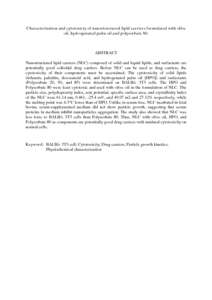Citation
How, Chee Wun and Abdullah, Rasedee and Abbasalipourkabir, Roghayeh
(2013)
Characterization and cytotoxicty of nanostructured lipid carriers formulated with olive oil, hydrogenated palm oil and polysorbate 80.
IEEE Transactions on Nanobioscience, 12 (2).
pp. 72-78.
ISSN 1536-1241; ESSN: 1558-2639
Abstract
Nanostructured lipid carriers (NLC) composed of solid and liquid lipids, and surfactants are potentially good colloidal drug carriers. Before NLC can be used as drug carriers, the cytotoxicity of their components must be ascertained. The cytotoxicity of solid lipids (trilaurin, palmitin, docosanoid acid, and hydrogenated palm oil [HPO]) and surfactants (Polysorbate 20, 80, and 85) were determined on BALB/c 3T3 cells. The HPO and Polysorbate 80 were least cytotoxic and used with olive oil in the formulation of NLC. The particle size, polydispersity index, zeta potential, specific surface area, and crystallinity index of the NLC were 61.14 nm, 0.461, -25.4 mV, and 49.07 m2 and 27.12% respectively, while the melting point was 4.3°C lower than of HPO. Unlike in serum-free, NLC incubated in fetal bovine serum-supplemented medium did not show particle growth, suggesting that serum proteins in medium inhibit nanoparticles aggregation. The study also showed that NLC was less toxic to BALB/c 3T3 cells than Polysorbate 80. Thus, NLC with olive oil, HPO, and Polysorbate 80 as components are potentially good drug carriers with minimal cytotoxicity on normal cells.
Download File
![[img]](http://psasir.upm.edu.my/29892/1.hassmallThumbnailVersion/Characterization%20and%20cytotoxicty%20of%20nanostructured%20lipid%20carriers%20formulated%20with%20olive%20oil.pdf)  Preview |
|
PDF (Abstract)
Characterization and cytotoxicty of nanostructured lipid carriers formulated with olive oil.pdf
Download (85kB)
| Preview
|
|
Additional Metadata
Actions (login required)
 |
View Item |

